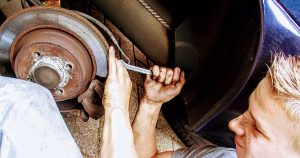 Vehicle maintenance is the less-than-fun part of vehicle ownership. While it can be a pain in the neck, staying on top of your car’s maintenance schedule can save you a lot of money and inconvenience in the long run. Your car will run better for longer when you keep it in tip-top shape, so it is important to understand what your car needs and how best to care for it.
Vehicle maintenance is the less-than-fun part of vehicle ownership. While it can be a pain in the neck, staying on top of your car’s maintenance schedule can save you a lot of money and inconvenience in the long run. Your car will run better for longer when you keep it in tip-top shape, so it is important to understand what your car needs and how best to care for it.
-
Engine Oil
Engine oil is a lubricant for the moving parts of your vehicle’s engine. These parts heat quickly when your vehicle is in motion, and if there is not enough oil, friction can cause severe damage to those metal parts. Similarly, if there is oil but it is dirty or sticky, it can cause the metal to erode, again causing harm to the engine. Both situations can end in engine failure, leading to a costly, major repair with your vehicle being out of commission for at least several days. By making sure your oil is topped off and keeping to a regular schedule of changing it, you can protect those engine parts and extend the life of your vehicle by several years.
-
Tire Pressure and Alignment
Proper tire pressure is important for maintaining your vehicle’s traction and cornering. When tire pressure is too high or too low, it can cause your tires to wear unevenly and excessively, making you have to replace them more often than is necessary. Check your owner’s manual to learn the correct amount of air pressure for your vehicle’s tires and make a habit of checking their pressure on a regular basis. It is also important to keep an eye on your tires’ alignment to be sure that your vehicle’s suspension is working properly.
-
Brakes
The brakes on most vehicles are a hydraulic system made up of pads that press together when signaled. They run on brake fluid, which can easily be checked for proper levels. If the fluid runs too low or the pads wear too thin, you might notice that it is harder to slow down or come to a complete stop. If you hear grinding sounds whenever you brake, it is likely time to replace your brakes. Keep an eye on brake fluid and brake pads; if you notice leakage or wear, address the issue before it gets worse.
-
Transmission Fluid
As its name suggests, transmission fluid lubricates the transmission of your vehicle. It is important to keep this fluid topped off, as allowing it to get low can lead to its contamination and, eventually, transmission failure. Checking your transmission fluid is a simple maintenance task that can save you money on costly repairs and time without your vehicle.
Vehicle ownership and regular maintenance go hand in hand. Maintenance is vital to extending the life and performance of your vehicle, and it pays dividends of money saved on expensive repairs and time saved in the auto shop. Learn how to maintain your vehicle and begin a regular schedule to keep it in great shape.
Image via Pixabay by Joenomias




